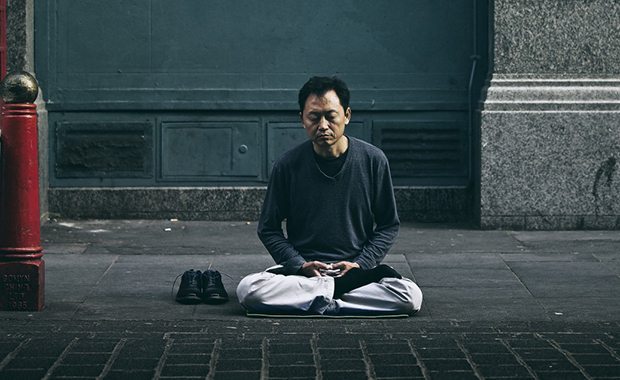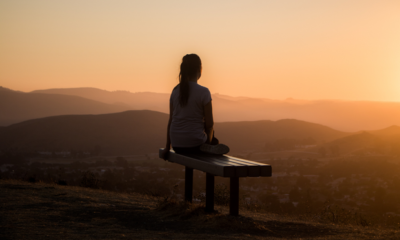Life
Meditation Makes You More Resilient. Here’s Why:

Imagine if you could always be happy. Imagine knowing no matter what happens—no matter how bad life gets, no matter how much pain and stress you go through—you could always come home at the end of the day and tap into a never-ending source of fulfillment, gratitude, creativity, and resilience.
That’s exactly what meditation is, what it does, and what it can feel like if you practice it on a daily basis. There are plenty of types of meditation out there. Mantra meditation involves repeating a certain word or phrase. Breathing meditation involves focusing on your breath. In guided meditation, an instructor guides you into a state of stillness.
No matter which type or style you choose to participate in, the purpose of all meditation is to free your mind—to free yourself from non stop thinking, anxiety, stress, and frustration percolating in through your brain. Meditation is a vehicle allowing you to pull yourself back from negative thoughts and negative feelings to reconnect with a beautiful and unbreakable state of joy that is your true nature.
As someone who has been a practitioner since 2013, I’ve been able to use meditation to bounce back from all sorts of setbacks, problems or tragedies over the past 4 years. No matter how negative or bleak the situation was, my response was always to pull myself aside for 20 minutes of stillness. Choosing to meditate not only evaporated the stress on my mind, but also gave me the clarity and creativity to figure out the best solution.
The beauty of it is it works consistently. There has not been a situation over the past 4 years that I have not been able to bounce back from or look back at as a blessing in disguise. It has brought me to a place in my life where nothing can faze me.
“Meditation is a way for nourishing and blossoming the divine within you.” – Amit Ray
Becoming unbreakable and unfazed by the struggles of life sounds weird, yet it makes perfect sense when you realize tenacity is our default state of mind. As humans, we are naturally joyful, peaceful and creative. Meditation is a vehicle for reconnecting you with that default state of mind you got disconnected with as a kid.
If you look out at any playground or schoolyard in the world, you’ll see that children are full of limitless joy, smiles, happiness, creativity, energy, love, and confidence. But as we grow older, most people slowly get more and more disconnected from their true nature.
The reason meditation works is it reconnects us with who we really are. It provides a vehicle that allows us to tap back into our highest and best qualities.
When you look out at the vast numbers of people across the country and across the world that are struggling with anxiety, stress, depression, and unfulfilled lives, this can be a very hard concept to wrap your head around. Nonetheless, it becomes very real when you look out at all of the results that millions of people across the globe have achieved through this beautiful practice. The proof lies in the results.
I myself have been able to remain sober from both drugs and alcohol for over 3 years and counting, wrote more than one book, started a blog, and found true fulfillment through doing this practice twice a day since 2013. And there are TONS of incredibly successful and high-achieving people out there who practice meditation—including Ray Dalio, Russell Simmons, Oprah Winfrey, Ellen Degeneres, Hugh Jackman, Jerry Seinfeld, Arianna Huffington, and many more!
These people are all proof that there is a wellspring of pure bliss, tenacity, strength, and resilience that resides within all of us. It’s not just within some people. It’s within everybody.
“Enjoy the time off from doing. Just be with yourself.” – Oprah Winfrey
Once you pick up the practice, you too will get to a place in your life where you feel like nothing can faze you. This is something that you can start doing right now. I want to end this blog post with some simple instructions from Russell Simmons’ Super Rich, the book that helped me get started:
“After sitting down and getting comfortable, the next step is to simply begin repeating your mantra. Since most of you reading this probably don’t have one yet, let me share a mantra that I’ve been taught and have found works well for novices: Rum.
Try not to think of it as a word, but rather as a vibration. ‘Ruuuuuuuuuuum.’ Say it loudly in your mind. Say it softly. Say it fast. Say it slow. Whisper it. Scream it. Fixate your mind on ‘Rum’ until that vibration fills up your being.
If you keep repeating ‘Rum’ for even just five minutes, you’ll feel yourself beginning to transcend the hundreds of frivolous thoughts that are cluttering your mind. Again, think of all those thoughts as waves on a stormy ocean. As the vibration of ‘Rum’ becomes stronger and stronger, soon the fluctuations of those waves will become smaller and smaller until your mind will be a calm, glassy sea. When those waves are gone, you’ll be entering a state of real stillness.”
Just a couple words of advice, if the above meditation exercise does not provide any results for you the first time around or if you don’t feel like it’s working for you, be patient. I didn’t get results the first time I tried it. And there are plenty of people around the world who don’t either. It takes patience and consistency.
Have you tried meditating? If so, let us know how it has gone for you by commenting below!
Image courtesy of Twenty20.com
Did You Know
How Skilled Migrants Are Building Successful Careers After Moving Countries
Behind every successful skilled migrant career is a mix of resilience, strategy, and navigating systems built for locals.

Moving to a new country for work is exciting, but it can also be unnerving. Skilled migrants leave behind familiar systems, networks, and support to pursue better job opportunities and a better future for their families. (more…)
Life
10 Research-Backed Steps to Create Real Change This New Year
This New Year could finally be the one where you break old patterns and create real, lasting change.

Every New Year, we make plans and set goals, but often repeat old patterns. (more…)
Life
9 Harsh Truths Every Young Man Must Face to Succeed in the Modern World
Before chasing success, every young man needs to face these 9 brutal realities shaping masculinity in the modern world.

Many young men today quietly battle depression, loneliness, and a sense of confusion about who they’re meant to be.
Some blame the lack of deep friendships or romantic relationships. Others feel lost in a digital world that often labels traditional masculinity as “toxic.”
But the truth is this: becoming a man in the modern age takes more than just surviving. It takes resilience, direction, and a willingness to grow even when no one’s watching.
Success doesn’t arrive by accident or luck. It’s built on discipline, sacrifice, and consistency.
Here are 9 harsh truths every young man should know if he wants to thrive, not just survive, in the digital age.
1. Never Use Your Illness as an Excuse
As Dr. Jordan B. Peterson often says, successful people don’t complain; they act.
Your illness, hardship, or struggle shouldn’t define your limits; it should define your motivation. Rest when you must, but always get back up and keep building your dreams. Motivation doesn’t appear magically. It comes after you take action.
Here are five key lessons I’ve learned from Dr. Peterson:
-
Learn to write clearly; clarity of thought makes you dangerous.
-
Read quality literature in your free time.
-
Nurture a strong relationship with your family.
-
Share your ideas publicly; your voice matters.
-
Become a “monster”, powerful, but disciplined enough to control it.
The best leaders and thinkers are grounded. They welcome criticism, adapt quickly, and keep moving forward no matter what.
2. You Can’t Please Everyone And That’s Okay
You don’t need a crowd of people to feel fulfilled. You need a few friends who genuinely accept you for who you are.
If your circle doesn’t bring out your best, it’s okay to walk away. Solitude can be a powerful teacher. It gives you space to understand what you truly want from life. Remember, successful men aren’t people-pleasers; they’re purpose-driven.
3. You Can Control the Process, Not the Outcome
Especially in creative work, writing, business, or content creation, you control effort, not results.
You might publish two articles a day, but you can’t dictate which one will go viral. Focus on mastery, not metrics. Many great writers toiled for years in obscurity before anyone noticed them. Rejection, criticism, and indifference are all part of the path.
The best creators focus on storytelling, not applause.
4. Rejection Is Never Personal
Rejection doesn’t mean you’re unworthy. It simply means your offer, idea, or timing didn’t align.
Every successful person has faced rejection repeatedly. What separates them is persistence and perspective. They see rejection as feedback, not failure. The faster you learn that truth, the faster you’ll grow.
5. Women Value Comfort and Security
Understanding women requires maturity and empathy.
Through books, lectures, and personal growth, I’ve learned that most women desire a man who is grounded, intelligent, confident, emotionally stable, and consistent. Some want humor, others intellect, but nearly all want to feel safe and supported.
Instead of chasing attention, work on self-improvement. Build competence and confidence, and the rest will follow naturally.
6. There’s No Such Thing as Failure, Only Lessons
A powerful lesson from Neuro-Linguistic Programming: failure only exists when you stop trying.
Every mistake brings data. Every setback builds wisdom. The most successful men aren’t fearless. They’ve simply learned to act despite fear.
Be proud of your scars. They’re proof you were brave enough to try.
7. Public Speaking Is an Art Form
Public speaking is one of the most valuable and underrated skills a man can master.
It’s not about perfection; it’s about connection. The best speakers tell stories, inspire confidence, and make people feel seen. They research deeply, speak honestly, and practice relentlessly.
If you can speak well, you can lead, sell, teach, and inspire. Start small, practice at work, in class, or even in front of a mirror, and watch your confidence skyrocket.
8. Teaching Is Leadership in Disguise
Great teachers are not just knowledgeable. They’re brave, compassionate, and disciplined.
Teaching forces you to articulate what you know, and in doing so, you master it at a deeper level. Whether you’re mentoring a peer, leading a team, or sharing insights online, teaching refines your purpose.
Lifelong learners become lifelong leaders.
9. Study Human Nature to Achieve Your Dreams
One of the toughest lessons to accept: most people are self-interested.
That’s not cynicism, it’s human nature. Understanding this helps you navigate relationships, business, and communication more effectively.
Everyone has a darker side, but successful people learn to channel theirs productively into discipline, creativity, and drive.
Psychology isn’t just theory; it’s a toolkit. Learn how people think, act, and decide, and you’ll know how to lead them, influence them, and even understand yourself better.
Final Thoughts
The digital age offers endless opportunities, but only to those who are willing to take responsibility, confront discomfort, and keep improving.
Becoming a man today means embracing the hard truths most avoid.
Because at the end of the day, success isn’t about luck. It’s about who you become when life tests you the most.
Change Your Mindset
The Four Types of Happiness: Which One Are You Living In?
Most people chase success only to find emptiness, this model reveals why true happiness lies somewhere else.

In a world driven by rapid technological growth and constant competition, many people unknowingly trade joy for achievement. (more…)
-

 News1 week ago
News1 week agoBrandon Willington Builds 7-Figure Business by Ignoring Almost Everything
-

 Health & Fitness2 weeks ago
Health & Fitness2 weeks agoWhat Minimalism Actually Means for Your Wellness Choices
-

 Did You Know2 weeks ago
Did You Know2 weeks agoWhy Most Online Courses Fail and How to Fix Them
-

 Business2 weeks ago
Business2 weeks agoIf Your Business Internet Keeps Letting You Down, Read This
-

 Business4 days ago
Business4 days agoEntrepreneur’s Guide to Pay Stubs: Why Freelancers and Small Business Owners Need a Smart Generator
-

 Business2 days ago
Business2 days agoThe Simple Security Stack Every Online Business Needs
-

 Finances2 days ago
Finances2 days agoWhy Financial Stress Is One of the Biggest Barriers to Personal Growth
-

 Scale Your Business2 days ago
Scale Your Business2 days ago5 Real Ways to Grow Your User Base Fast


























2 Comments